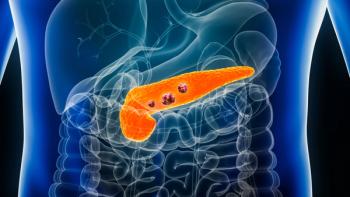
Zolbetuximab is the first approved CLDN18.2-targeted treatment for gastric and gastroesophageal junction adenocarcinoma.


FDA Grants PLT012 Orphan Drug Designation for Liver, Intrahepatic Bile Duct Cancer

Zolbetuximab is the first approved CLDN18.2-targeted treatment for gastric and gastroesophageal junction adenocarcinoma.

Subcutaneous administration of atezolizumab and hyaluronidase-tqjs had similar efficacy to intravenous administration.

The FDA assigned the combination a Prescription Drug User Fee Act goal date of April 21, 2025.

The designation is based off positive results from the RAMP 205 trial presented at the ASCO Annual Meeting.

If approved, zanidatamab will be the first HER2-targeted treatment indicated for individuals with this type of biliary tract cancer.

The authors note that the biomarkers found in the blood were involved in inflammatory processes, immune functions, or vascular processes, and may be pre-diagnostic indicators.

Trastuzumab is indicated for adjuvant breast cancer, metastatic breast cancer, and gastric cancer.

This approval makes lutetium Lu177 the first therapy to be approved for the treatment of gastroenteropancreatic neuroendocrine tumors in pediatric patients.

The designation was granted based on overall survival data from an ongoing randomized phase 2 clinical trial.

Study outcomes demonstrated that 80 HER2-postive BTC individuals enrolled in Cohort 1 of the study achieved a confirmed objective response rate of 41.3%

The orphan drug designation (ODD) is a result of positive findings from a phase 2 clinical trial which demonstrated a 100% clinical benefit rate in patients.

PT886 (Phanes Therapeutics) received fast track designation 2 years after receiving orphan drug designation by the FDA.

“I see clinical pharmacy specialists (CPS) to be more like the frontline folks that would pretty much work very closely with the providers,” according to a CPS at City of Hope.

For more than 30 years, there has been little treatment advancement for NMIBC patients. Fortunately, a new development in the treatment of NMIBC has been approved by the FDA and is now available.

The approval of irinotecan liposome offers an improved first-line treatment option for individuals diagnosed with metastatic pancreatic adenocarcinoma.

This review summarizes current utilization of anti-HER2 targeted therapy across several non-breast solid tumors in the setting of advanced disease.

Compared to TACE alone, durvalumab plus TACE and bevacizumab reduced the risk of disease progression or death by 23%; however, further research is needed to assess OS.

There was no statistically significant difference between Lovenox (Sanofi–Aventis Pharmaceuticals, France) and biosimilar enoxaparin in the occurrence of post-operative thrombosis for digestive cancer.

The approval makes pembrolizumab the first-line treatment for individuals with this cancer.

With this approval, fruquintinib is the first and only selective inhibitor of all 3 VEGR receptor kinases to be approved in the United States for previously treated mCRC, regardless of biomarker status.

Domvanalimab plus zimberelimab with chemotherapy demonstrated a positive overall response rate and 6-month progression free survival rate for patients with upper gastrointestinal cancers.

The approval marks the sixth indication for pembrolizumab in gastrointestinal cancers.

Mental health treatment may be necessary when SAEs occur.

The results also indicate an association with increased risk of colorectal and noncolorectal gastrointestinal cancers as body mass index increases over time.

Lutetium Lu177 dotatate demonstrated significant and clinically meaningful progression-free survival for those with SSTR-positive and inoperable midgut neuroendocrine tumor.